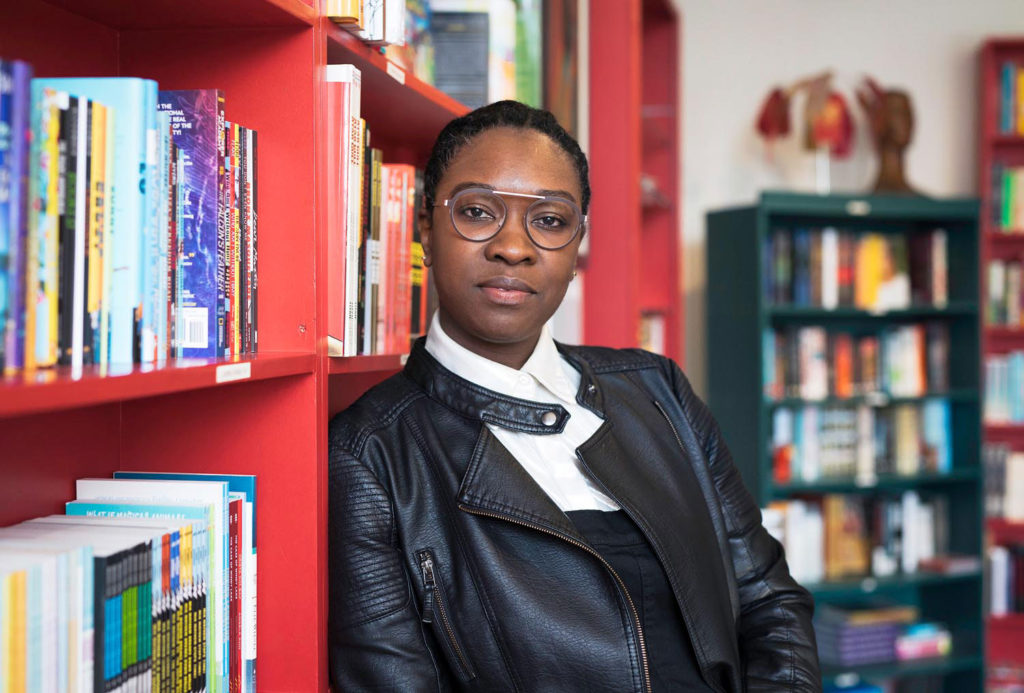Canisia Lubrin’s literary star isn’t merely on the rise. It’s embedded, twinkling, in the firmament. In the past few months, she’s won the 2021 OCM Bocas Prize for Caribbean Literature, the 2021 Griffin Poetry Prize, and a 2021 Windham-Campbell Prize in Poetry — you might imagine glittering achievements are now par for Lubrin’s poetic course. Yet accolades are the least of what we discuss in our Zoom interview: instead, Lubrin tells me about her earliest songs.
“In St Lucia, as a child, the first stirrings of language came to me in my grandmother’s folktales, stories, and songs,” she says. “I look back and see the markings of poetry in my life, on that small island.” Nothing has ever been miniature about the imagination of St Lucia, Lubrin’s birthplace and physical home till she emigrated to Canada as a teenager for education. The countryside, where she grew up, was replete with culture: folk music, rural theatre troupes, her mother’s storied trip to Dominica for an acting gig. These were glowing hallmarks of Lubrin’s life in language, too.
They resided in her spirit, she says, while she devoured the plays of Derek Walcott in high school — though, she reflects with an arch smile, she can’t recall ever learning a single Walcott poem in those classrooms. Instead, Ti-Jean and His Brothers straddled Shakespeare’s Julius Caesar and Sam Selvon’s A Brighter Sun. When Lubrin learned that English literature would be summarily struck from the academic offerings after form three, owing to a staffing deficit, she was disconsolate. Literature, she knew then, was something she needed to do.
Writing, reading, feasting on language were her St Lucian rituals. She laughs as she summons a memory conjured by her sister during a pandemic chat: an image of five-year-old Canisia, lying on her stomach, legs kicked up behind her, utterly rapt in the pages of a massive set of newly bought encyclopaedias. “Was I reading every word?” she muses out loud, her eyes gleaming with the past vision of her younger self. “Perhaps not, but I was marvelling, in those encyclopaedias, at what a world we have.”
Others, as the years progressed, would come to marvel at her: a form three teacher held Lubrin’s composition on “The Day After the Storm” aloft, running through the hallways effervescing with joy at what she had written. “My goodness. You wrote this? You did this? You have to keep writing. You did this.” Continue she did. She remembers the animating spark fuelling her application letter to York University in Toronto, which she’d go on to attend, and the clear sense that she was on her way to a future that not only involved writing, but centred it. A future, indeed, where such a thing as “being a writer” was not amorphous, speculative, otherworldly — but as real as flesh, blood, and bone.
Emigration challenged Lubrin physically — “I felt as though I’d walked into a freezer,” she says, wincing, conjuring thoughts of her first frigid autumn and winter — and philosophically. Immersing herself in Toronto, she learned, meant being confronted by a place where “I knew I’d met a lot of closeted issues about race and the way power functions, what it means to be othered.” Finding community in this city was initially rough going, coupled with the aggressions, micro and major, thrown into her path: she remembers being followed in shops with suspicion, and having the ubiquitous anti-Black slur thrown at her during the course of her stints at nannying and factory work. It was a sharp insight into how daily-paid labourers, those assigned to allegedly menial tasks, are nonetheless reduced within their Black and brown bodies in one of Canada’s richest cities.
Yet, as much as Lubrin maintains Toronto is still a hard locale, she unsurprisingly loves the woven pattern of its many languages. She delights in telling me that, here, “You can walk through Portuguese, then streets away you’re in Spanish, in Hindi, in Cantonese. There’s something magical about a place where this is the ordinary.”
From the streets to the library stacks, Lubrin actively sought language, finding a revelation in the poetry and prose of Trinidad-born writer Dionne Brand. Up to that point in her undergraduate career, there was but one Derek Walcott poem on the syllabus, “Forest of Europe”, and Brand had not been explicitly taught. It was only following an urgent recommendation from her teaching assistant on a satire course, Stephanie Hart, that Lubrin “ran, not walked” to the library, seizing No Language is Neutral and Land to Light On, reading the former in one fell swoop. She laughs at the recollected miracle of it, saying how “utterly pissed” she was that Brand had not been formally introduced into her academic learning, alongside the feeling of sheer, unalloyed gratitude for the fact of Brand’s writing in the world. Not many years after this, Lubrin would be sitting in Brand’s graduate poetry seminar, another vital thread in the making of an intimate professional and creative bond between them.
Entering publication’s lettered halls, however, proved daunting. Four solid years of journal rejections lined Lubrin’s path, so much so that a solicitation from an editor at publisher Wolsak and Wynn for what would become her first book, Voodoo Hypothesis (2017), shook her. The first twelve poems she’d written during Brand’s course were included in that manuscript, but it was spilt blood that gave the work its form and voice.
In 2016, Lubrin, alongside countless others, reeled at the murder of Philando Castile, slain in front of his partner Diamond Reynolds and her four-year-old daughter near Minneapolis, Minnesota. That summer, Canisia grimly nods, was a horrific sequence of violence against Black bodies and minds. The killings piled up, and Lubrin took to her pages, reworking ninety-five per cent of Voodoo Hypothesis to reflect the conditions of the world as she saw them, “through my place as a diaspora woman writer, with my queer lens.” The result was a debut book committed to “raising up language like a shield against European histories and sciences,” as poet Sonnet L’Abbé described it. But while Voodoo Hypothesis was astonishing in its power, it was only Lubrin’s beginning.
The Dyzgraphxst (2020), her second collection, took its first pulse from interrogation. Dionne Brand, in whose conversations “books are made,” says Lubrin fondly, asked the younger writer about the absence of the “I” voice in her poems. This prompted soul-and-verse searching, and when the first draft of the manuscript arrived, Brand asked “Who is this Jejune? We need more of this voice.” Thus, what had been intended as a peripheral figure became the animating force of The Dyzgraphxst, a narrator not restrictive in vision, but invitational: “I absolutely found that I was reflected in the concerns of the language, and could make that space horizontal rather than vertical, so you can enter it, so I can sit with you, so the next person can enter and sit with us.” Critical responses to Lubrin’s sophomore offering might be said to speak for themselves, and the poet is modestly conscious — not to mention grateful — for the space and time that literary prizes create for her writing. Fame, however, has never been her ambition. She pursues something far less glittering, but perhaps no less inwardly luminous.
“I had to break the language open, reconfigure it so something different could come to the world — jagged, not making apology for its breakages, that simply exists and shows what it shows,” Lubrin says of her labours. In her roles as educator and poetry editor at publishing house McClelland & Stewart, her work is as originary, as border-resistant. “In every sphere, I try always not to make it about me, to enter into a kind of appreciation for what is possible,” she concludes, already envisioning multiple worlds where language — Canisia Lubrin’s guiding light — reveals what has always been.

